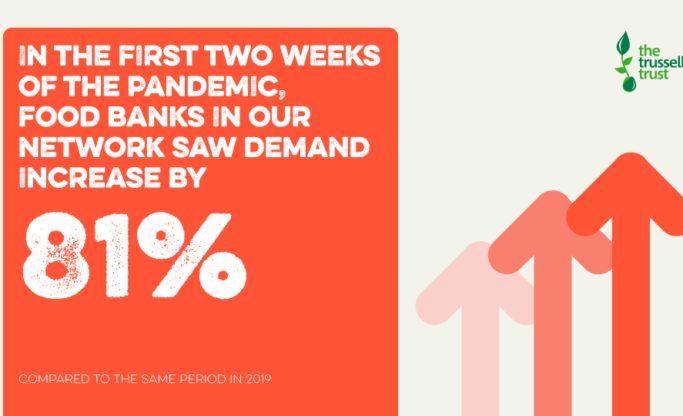News
The Trussell Trust reports a 81% increase for emergency food parcels from food banks during the last two weeks of March 2020.
1st May 2020
-
Share this:
- Share on facebook
- Share on twitter
- Share on linkedin

Food banks report record spike in need as coalition of anti-poverty charities call for strong lifeline to be thrown to anyone who needs it
- The Trussell Trust reports a soaring 81% increase for emergency food parcels from food banks in its network during the last two weeks of March 2020, compared to the same period in 2019 – including a 122% rise in parcels given to children, as the coronavirus pandemic continues to unfold1
- Food banks in the Independent Food Aid Network (IFAN) report an average 59% increase in need from February to March. That is 17 times higher than this time last year2
- A coalition of charities, including Child Poverty Action Group (CPAG), Children’s Society, Joseph Rowntree Foundation (JRF), StepChange and Turn2us, is calling for a temporary Coronavirus Emergency Income Support Scheme to ensure people facing financial hardship can access the resources needed to stay afloat
The Trussell Trust reports its network’s busiest ever period, with 81% more emergency food parcels being given out across the UK, including 122% more parcels going to children, compared to the same period in 2019.3 The data shows people struggling with the amount of income they were receiving from working or benefits as the main reason for the increase in need.
IFAN has also reported a record level of need with an average 59% increase from February to March 2020. That is 17 times higher than this time last year.
Food banks are working to continue providing emergency food safely to people who cannot afford to buy the essentials, despite this unparalleled surge in demand – but warn they cannot continue to pick up the pieces.
A coalition of charities, including the Trussell Trust, IFAN, Child Poverty Action Group (CPAG), Children’s Society, Joseph Rowntree Foundation (JRF), StepChange and Turn2us is now urging the government to strengthen the anchor it has already put in place to help protect many people from being swept into destitution as more than 1.8 million people apply for Universal Credit in recent weeks4.
The coalition credits the government for a series of significant measures swiftly brought in, recognising the Coronavirus Jobs Retention scheme and additional investment in Universal Credit and the Local Housing Allowance, as huge boosts.
But the coalition warns these changes are unlikely to offer a strong enough lifeline to people in light of the new economic crisis faced. With demand for emergency food parcels already soaring over the past five years and research showing that household’s referred to food banks are on average, left with just £50 per week after housing costs,2 the coalition is urging the government to build on its work so far and make the changes needed to ensure each and every one of us has enough money for essentials.
To help the nation weather the storm of this pandemic the coalition is urgently calling on the government to provide a Coronavirus Emergency Income Support Scheme that supports individuals and families who are already facing or at serious risk of financial hardship. It also calls on the government to work with charities in the anti-poverty sector to develop this scheme and ensure it can be put in place quickly, treats everyone with dignity, and leaves no-one behind.
The coalition proposes this temporary package to include measures such as:
- Increasing benefits that go to families to help with the costs of raising children
- Extending the suspension of benefit deductions to cover advance payments – these are often taken to cover the five-week wait for a first Universal Credit payment
- Lifting the benefit cap and two-child policy to ensure this support scheme benefits everyone
- Ensuring local authorities in England can provide effective crisis support to individuals and families
Chief executive of the Trussell Trust Emma Revie says:
“The last few weeks have shown we must come together to protect each other against the unexpected. Like a tidal wave gathering pace, an economic crisis is sweeping towards us – but we don’t all have lifeboats. It’s not right that this has meant some of us don’t have enough money for essentials and are being pushed to food banks. Now is the time to build on the foundations our government has laid. We need emergency measures to ensure people can makes ends meet during this crisis. We have the power to come together as a country and make sure support is there to stop any of us being swept into poverty during this emergency.”
Coordinator of the Independent Food Aid Network Sabine Goodwin says:
“Independent food bank teams in our network are also seeing steep rises in need for emergency food parcels as the consequences of COVID-19 take hold. They are doing all they can to support people unable to afford to buy food for themselves. But the escalating food insecurity crisis is avoidable. The solution is not in trying to distribute more food parcels but in providing sufficient income to the huge numbers of people impacted by this crisis and the poverty that preceded it.”
Chief executive of Child Poverty Action Group Alison Garnham says:
“We all want a safety net that can bring families through tough times but today’s figures show we no longer have that in the UK. Instead when a crisis strikes, we have more and more children in food banks. That isn’t right. The government made a good start with its Covid-19 financial support measures but as today’s figures show, we need targeted support for children if we are to shield them from poverty. Raising the level of all benefits for children would be the most effective way of getting support to families quickly. It’s our moral responsibility to make that investment – because no child should be reliant on charitable food packages.”
Chief executive of The Children’s Society Mark Russell said:
“These figures are a stark indication of just how many more families are facing financial difficulties as a result of the Coronavirus and it is clear more must be done. The Children’s Society wants to see more money being put into local welfare assistance schemes. Our research found 1 in 7 councils are no longer providing crisis support, yet we have learned more and more people are turning to their local authorities for help.
“We want the government to give councils the investment they need, so they can be there to help during these unprecedented times and far beyond. Without it even more families will have nowhere to turn and could end up facing hunger, extreme poverty and even destitution.”
Acting director of the Joseph Rowntree Foundation (JRF) Helen Barnard says:
“It’s simply not right that so many more people are having to turn to food banks because they are unable to meet their basic costs. We all want to help each other weather this storm, but families with children are being particularly hard hit and do not have the lifeline they need to stay afloat. Millions already caught up in poverty face deepening hardship, whilst many more risk being pulled into poverty alongside them.
“It’s vital that our social security system can act as an anchor in tough times, and keep people afloat when they need it most. While the government has introduced some additional measures, many people are still not getting the support they need to weather this storm. Temporarily boosting support to families with children would provide a lifeline to those most at risk of hardship.”
StepChange chief executive Phil Andrew says:
“These shocking figures lay bare the toll this crisis is taking on the most vulnerable in our society. StepChange’s services saw record demand over the same period, with advice on how to access emergency financial relief among the most regularly sought. Clearly, financially vulnerable people are already struggling to keep up with payments and avoid hardship and help announced from creditors, local authorities and government is vital but only short term and not always adequate. Household finances are likely to lag behind any future economic recovery without a longer term plan in place, which is why it’s crucial we see continuing development of the government’s current rescue package to ensure the benefits system provides meaningful support to those falling through its gaps.”
Chief executive at Turn2us Thomas Lawson says:
“Food banks across the country have been providing critical support to people in the face of the growing income crisis that we are experiencing as a country. The coronavirus pandemic has exacerbated this and is driving even more people into financial crisis.
“Our own recent survey shows that one in every eight people cannot afford enough food to feed themselves. Their family incomes are only going to continue to drop.
“Food banks are vital, now more than ever, but we need to remember that they are not a long-term solution to the problem. They can only ever be a sticking plaster to tackle destitution – a situation as a wealthy country we must not tolerate.
“What people need is a Coronavirus Emergency Income Support Scheme, so they have the income they need to put food on the table. The government must make the safety net catch everyone who falls into hardship. Anyone who slips through is a damning indictment of our society.”
